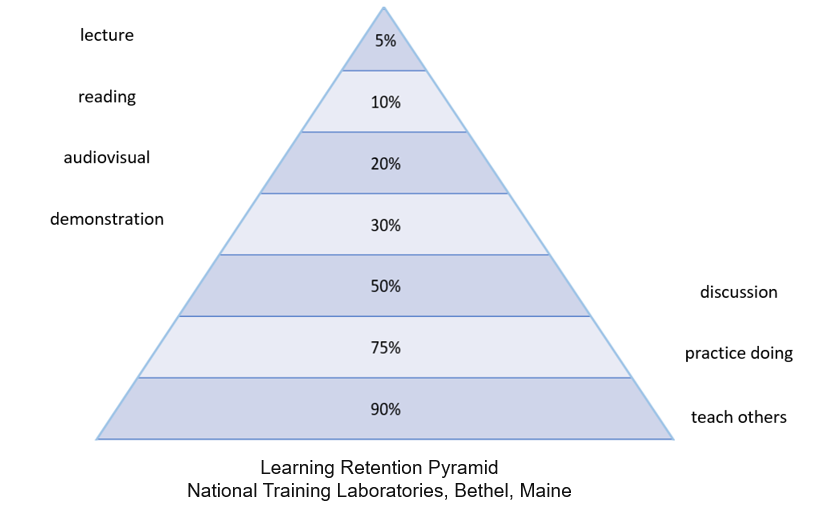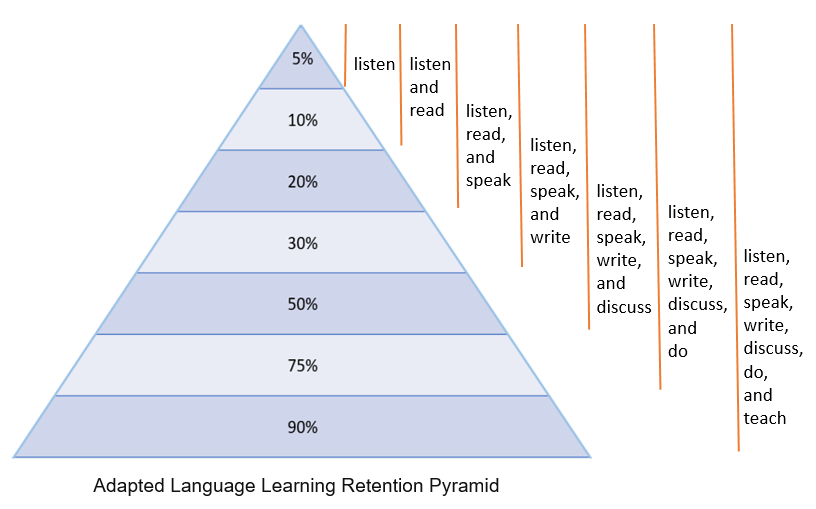To improve your English skills, you need to hear, speak, read, write, do, and teach those things you learn. Those things would be vocabulary, grammar rules, and any information you acquire.
The Learning Retention Pyramid

This Learning Retention Pyramid is a popular concept in education. Many educators follow it, while a few debunk it for few reasons.
Educators use this pyramid to encourage fellow educators not to settle with merely giving a lecture. The pyramid shows that reading materials, audiovisual aids, and demonstrations will improve student’s learning. Moreover, activities such as discussion with someone, practice in daily life, and teaching others will help maximize learning.
The lecture until the demonstration parts are the expected teacher’s actions. The discussion, practice, and teaching parts are the students’. Even though the last three are the students’, the teachers can add these to the assignments for the students.
Following this concept would help the teachers in reaching their goals for the students.
Improve your English by practicing all skills.
As learners of English as a second or foreign language, we can learn something from the Learning Retention Pyramid.
I made some changes in the presentation of the pyramid. Let me call it as Adapted Language Learning Retention Pyramid. It’s like this with the following possible average retention rates:

5% if you only hear something or simply do listening
10% if you listen and read
20% if you listen, read, and speak
30% if you listen, read, talk, and write
50% if you do the above and do discussions with someone
75% if you do the above and apply it in daily life
90% if you do all of the above and teach what you learn
Listening and reading are both receptive skills, and speaking and writing are productive skills. If you do discussions, you are using listening and speaking skills. If you are teaching in the classroom or online, you are using listening and speaking skills. In my case, I’m teaching English online (one-to-one), and I’m teaching through this blog. Thus, I’m using listening, speaking, reading, and writing skills. I’m also using and improving my vocabulary and grammar.
Now, I will add two other necessary skills—grammar and vocabulary that are equally important to convey your message more correctly and effectively.
Improve your English communication skills by applying them in daily life.
My Experience as an English as a second language learner
I was an English as a second language learner myself as I come from the Philippines with Tagalog as my native language.
I did my primary and secondary studies in the province. Though the teachers trained us well with English vocabulary, grammar, and reading, we had few tasks to practice writing in English. Worse, we had fewer opportunities to speak the language.
However, I had some opportunities to hear English as a spoken language through movies and later through television. I was born in the 1960s, and my family could watch movies once a week. At least, we could, and that helped.
In high school, I listened to English songs that were popular on the radio. I wrote thoughts in English in my diary. However, I didn’t speak English as my second language at home and with friends.
Somehow, in our province, there was a “silent” notion that when people speak English in daily conversation, they are “sosyal” or “burgis”, pretending to be elite.
Thus, though I got myself to the top university in my country, I lacked confidence in speaking. I felt insecure in the presence of classmates from the cities, exclusive schools, and wealthy families. They spoke English in their homes, with friends, and in the schools. Thus, they could speak English naturally, fluently, and confidently.
Towards the fourth or fifth year, to prepare for the thesis deliberation, I enrolled in a 10-hour speaking class where the last activity was to speak in a recorded video. Then, I decided to go out interviewing people in English. Those settled my lack of confidence in speaking the language.
Now, I’ve been using English more than I use my native language as an English teacher.
My experiences as a foreign language learner
I have tried to learn three other languages— Thai, German, and Japanese.
I studied basic Thai for two weeks before going to Thailand in 1996. Having lived there for a while, I used the language in simple ways like ordering food in eateries and communicating with taxi drivers and vendors. Because I used the simple language I learned in practical ways, I still remember most of what I learned until now.
I studied A1 level of the German language at Goethe Institute Manila. I passed the A1 level exams with a 97% score. However, I could not continue, sold my books, and didn’t practice with anyone. As a result, I can only remember few words learned.
I tried to do self-study for the Japanese language. I found a good site for learning the language—JapanesePod101. For lack of diligence in giving time to study the language and with no one to practice the language, I can only remember few words learned.
In conclusion, to improve your English communication skills, you should practice all skills and use the language in your daily life. When you do, you don’t need to panic or be shy when someone talks to you in English. English will become a language you naturally use fluently, effectively, and confidently.

